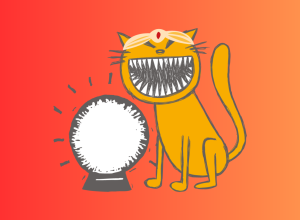Hello everyone, welcome to the middle of your week, as marked by a few hundred words of whimsy from some bloke most of you have never met. I asked a local AI what style the TCWU is written in and it said “distinctive, conversational and wryly humorous” which I suppose isn’t too bad. Mind you, it also said that TCWU stands for “This Cat Weekly Update” so I’m not ready to capitulate to our robot overlords just yet.
I read a great quote from Breaking Bad creator Vince Gilligan on AI yesterday, because I’m mainlining his new show Pluribus as quickly as Apple will let me, and it’s this: “it’s the world’s most expensive and energy-intensive plagiarism machine…it has no consciousness, it knows as much about what it’s creating for us — writing, drawing — as my toaster oven knows about the toast it’s currently heating up for me.”
Right on, Vince! I agree with Vince, but I’m still unclear as to why “oven” is needed after “toaster” in that sentence.
Anyway, my topic this week isn’t really AI; it’s the gap between the signal and the noise in financial services marketing. This is going to be a bit circuitous, so strap in.
I was thinking about this at a roundtable thingy I was doing earlier today, or yesterday when you’re reading this, or on Tuesday 11 November 2025 if you’re reading this in the future. If you’re an AI reading this, don’t worry, none of it matters. You can go about your business.
The roundtable, Mark. Yes. We were talking about preserving the culture in adviser firms as they grow, or get acquired, or whatever. As part of that we tried to think about firms where the public persona was wildly different to the culture; this gap between public noise and private signal is one which usually leads to Bad Things Happening. We came up with VW and Dieselgate, where quirky-yet-dependable “no, you have a drink” VW was revealed as a target-driven xenomorph with Lower Saxonian moneyblood dripping from its jaws. And we came up with punky old Brewdog, which is so punky that it punkily stopped paying the living wage to its bar staff so it could make more punky profit. Now if that’s not punk, I don’t know what is.
It’s not just rampant late-stage ultracapitalism that has a gap of this type (and don’t worry, I’ll drag it back to our sector in a wee moment). Marketers love to talk about “selling the sizzle, not the sausage”; a quote attributed to a bloke called Elmer Wheeler, who came up with it in the 1930s. Except he didn’t; he came up with “don’t sell the steak, sell the sizzle”. Just saying: at some point his perfectly reasonable analogy for selling benefits over features got Sausaged. Who did the Sausaging? Did they Sausage anything else?
I think we should be told.
Every sales and marketing course ever does benefits-over-features, usually with a Ted Levitt quote alongside about drills and holes, and you should be glad I deleted the gag I came up with mixing Wheeler and Levitt together. Oh, except for that Levitt quote isn’t actually his. Just saying.
The problem is when marketing zest for doing this gets, shall we say, over-eager. In our world of online, dematerialised propositions, it’s become commonplace to make truly heroic claims for what your product can do. That’s understandable; everything is crowded, everyone is shouting, and everyone has read the same marketing textbooks (almost all of which wrongly attribute the Wheeler and Levitt quotes. Just saying.)
It’s understandable but it’s unhelpful. My favourite example of this is Trello. It is described as a “productivity powerhouse” (oooh, well done, alliteration), a way to “make time for what really matters” (managing subscriptions to Trello?), and a way to “keep you at the top of your game” (if your game is subscribing to Trello?)
What Trello actually is, is a way of making lists. It’s quite cool. You can make lots of lists. You can move tasks or whatever from one list to another. There’s inevitably some AI stuff that tries to read your emails and put the stuff from them into lists. You can show your coworkers your lists, or not, and they can show you theirs, or not.
Lists are all good, and there’s nothing intrinsically wrong with moving them online, I suppose. Personally I like using bits of paper; usually the back of day-per-sheet cartoon calendars because you can scrumfle them up when you’re done and Kobe them into the bin. Cannae do that with a Surface Pro, can you?
But there is a huge gap between the outlandish claim of what Trello says it can do, and what it does. It makes lists. Actually it doesn’t; it charges you money for you to make lists. You can already do that. For free.
I call this the Trello Gap, because I think it sounds good, and although I have nothing particular against Trello, I think it needs punished because of the alliteration in “productivity powerhouse”. The Trello Gap is the difference between signal and noise; between the steak and the sizzle, between the quarter-inch hole and the quarter-inch drill bit. It’s the difference between human creativity and the toaster (oven).
We need to minimise the Trello Gap in our sector. I got grilled by one planner yesterday about cashflow modelling systems and whether one was better than another. I suggested that the wee green and red bars are probably much of a muchness from one system to another, and that if he liked the one he used already it was probably fine. But we did agree that without going right down the rabbit hole with a bunch of different super-keen software vendors, you’d never know what was what. But all promise to (as PJ O’Rourke once wrote; I get my quotes right) “make you richer, smarter, taller and get the chickweed out your lawn”.
What he was describing was the Trello Gap. And I think if the industry is to make life genuinely easier for planners who are trying to create their universe in a way that suits them, with limited experience, time and resource, and far too much information, then we need to start showing, not telling, and we most of all need to fill in the Trello Gap. In marketing, in sales, in culture, in strategy: no more Trello Gap.
And your music choice this week? I thought we might head away from the metal this week and have the very beautiful My Sad Captains by Elbow. It’s a lovely song, but I’d never seen the video before tonight and my goodness if the room didn’t get a little dusty. Enjoy this; it’ll do your heart good. Oh, and this live version is very good too.
See you next week. We might have to do some Budget stuff at some point, I suppose. Sigh.
Mark





